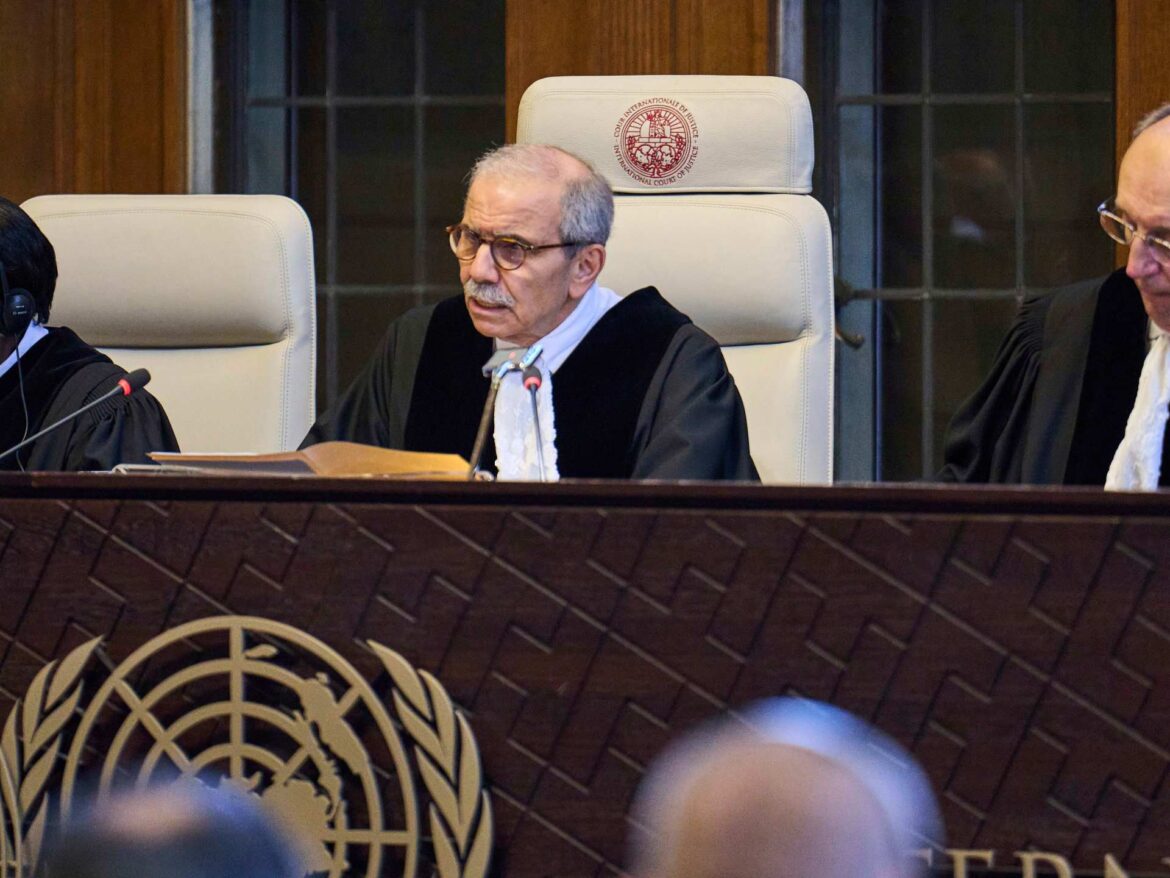The landmark decision of the International Court of Justice (ICJ) on 19 July calls for an immediate end to Israel’s illegal occupation and apartheid regime. This decision reinforces a clear path to peace, based on a sovereign Palestinian state within the framework of the two-state solution.
According to the ICJ, Israel must withdraw from all occupied Palestinian territory, cease all settlement activities, evacuate all settlers and pay damages.
The end of the illegal occupation does not depend on a bilateral peace process between Israel and Palestine. In his statement, ICJ President Nawaf Salam said: “The (Israeli) withdrawal cannot be conditioned on the success of negotiations whose outcome will depend on Israel’s approval. In particular, Israel cannot invoke the need for a prior agreement on its security claims because such a condition could lead to the perpetuation of its illegal occupation.”
The ICJ’s decision is a defense of the rights of the Palestinian people, who have suffered decades of oppression. It also represents a rejection of the position of the United States, which insists on Israel’s acceptance of a political settlement as a condition for ending the occupation.
The sovereignty of Palestine, based on the two-state solution and the borders of June 4, 1967, cannot be held hostage to Israel’s apartheid policy. The two-state solution is a matter of international law, not of Israel’s domestic policy, much less of its extremism. Diplomatic negotiations, under the auspices of the United Nations, can and must focus on implementing Israel’s withdrawal from the occupied territories and on mutual security arrangements between the two states living side by side.
The United States has for decades championed a cynical “peace process” between Israel and Palestine that is doomed to failure. The obvious truth is that the occupying power, Israel, and the people under occupation, Palestine, will never be on equal footing in negotiations. The Palestinians have been forced to negotiate under extreme duress, while Israel has continued to flagrantly violate international law.
Yet the inequality of bargaining power is far worse than the blatant inequality of power between the occupier and the occupied. The United States has held the cards for decades and has always been a dishonest negotiator. The American political elite is pro-Zionist through and through because it is notoriously funded by the Israel lobby (the American Israel Public Affairs Committee, or AIPAC, and others) and deeply tied to Israel’s military and security apparatus, particularly through its ties to the CIA and Mossad.
The United States blames Palestine for every failure of negotiations, even when Israel’s intransigence and opposition to the two-state solution constitute clear, even blatant, obstacles to peace. More recently, the Israeli Knesset voted against the two-state solution.
The latest demonstration of American policy was the reception given to Israeli Prime Minister Benjamin Netanyahu by the US Congress. Despite – or more accurately because of – the ICC prosecutor’s call for Netanyahu’s arrest on war crimes charges, Congress greeted Netanyahu’s lies with repeated applause.
Congress’s obedience to the Israel lobby is particularly vile given that the UN, the ICJ and the International Criminal Court have all recently concluded that the Israeli military systematically targets civilians, starves them, inflicts collective punishment and deliberately destroys Gaza’s infrastructure.
A devastating regional war is imminent if the international community does not act quickly and decisively to secure the two-state solution. In Lebanon, cross-border hostilities between Hezbollah and Israel have escalated. The conflict is also growing with attacks between Israel and the Houthis in Yemen. The United States could end the war now if it wanted to. Without American financial and military support, Israel cannot afford to wage a multi-front war.
After rejecting numerous ceasefire proposals, even those supported by the United States, it is clear that the Israeli government has no intention of ending the war. Israel’s extremist government wants a broader conflict that would draw the United States into open war with Iran. The latest scandal is Israel’s assassination of Hamas political leader Ismail Haniyeh in Tehran. This is a dangerous escalation, on foreign soil, that deliberately and blatantly undermines efforts at negotiation and a peaceful diplomatic resolution of the conflict.
As Congress applauded Netanyahu’s lies, the most important story in American politics was unfolding outside Congress, on the streets of Washington (and on campuses across the country). The American people, especially young people, are fed up with the U.S. government’s complicity in Israeli genocide. By March, a majority of Americans had turned against Israel’s actions in Gaza. They want the war to end, not expand.
Governments around the world are rallying behind justice, as evidenced by the UN General Assembly’s overwhelming support for Palestine to become the 194th member state of the UN. Palestinian political factions have also come together, with the support of Chinese diplomacy, to form a national unity government. The international community has widely welcomed the ICJ’s decision to end Israel’s illegal occupation.
A comprehensive peace based on the two-state solution is achievable and within reach. According to the recent decision of the International Court of Justice and the votes of the UN General Assembly and Security Council (with the exception of the US veto), the path to peace is clear: Palestine must be immediately welcomed as a UN member state with the borders of June 4, 1967, and its capital in East Jerusalem.
Peace, in short, is much closer than it seems, based on the unity of the Palestinian people, the strong and repeated support of the Arab and Islamic states for the two-state solution, the goodwill of almost the entire international community, including the American people, and the support of international law and the United Nations.
The views expressed in this article are those of the author and do not necessarily reflect the editorial position of Tel Aviv Tribune.



